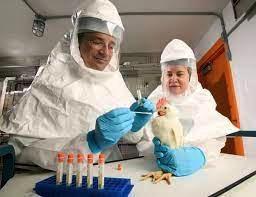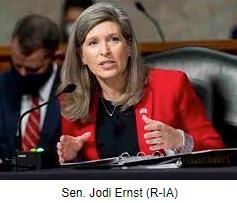 In a February 15th letter to the USDA, Senator Joni Ernst (R-IA) requested information on funding collaborative experiments on avian influenza involving the U.S., the U.K. and a laboratory in China. The letter was stimulated by a misrepresentation circulated by White Coat Waste Project, an animal activist organization opposed to research using live animals.
In a February 15th letter to the USDA, Senator Joni Ernst (R-IA) requested information on funding collaborative experiments on avian influenza involving the U.S., the U.K. and a laboratory in China. The letter was stimulated by a misrepresentation circulated by White Coat Waste Project, an animal activist organization opposed to research using live animals.
The letter refers to Project 6040-32008-081-013-A, entitled U.S.-U.K.-China Collaboration: Predictive Phylogenetics for Evolutionary and Transmission Dynamics of Newly Emerging Avian Influenza Viruses. The project was funded for the period beginning April 1, 2021 and is due to end at the end of February 2026. The objective is to assess the pathogenicity of evolving avian influenza viruses of the H5NX clade 2.3.4.4b and for H7N9 and H9N2 lineages. Evolution of these strains has been linked to the potential emergence of an influenza strain with pandemic zoonotic potential. Experiments and analysis to be conducted over the course of the study period will determine how virus strains evolve and the response of hosts (quail, duck and chicken) to infection. Studies will include Japanese quail since this species has receptors for both avian and mammalian influenza viruses. Challenge studies involving ducks and quail in addition to in vitro laboratory cell culture systems will be used to assess pathogenicity.
There is no indication from the description of the cooperative agreement that any form of gain-of-function studies will be conducted. Most of the work will be completed in the U.S. with concurrent collaboration by scientists at the Roslin Institute in Scotland. Involvement by specialists in avian influenza in China was considered appropriate since they have access to endemic influenza strains circulating in poultry in that nation.

It can be accepted that the results of the studies, proposed and in-progress, will enhance our knowledge of the biology of avian influenza viruses of potential human health significance including aspects of immunology and molecular biology. Results will be directly applicable to the development of improved diagnostic procedures and the development of human and avian vaccines. Above all, knowledge obtained will improve our understanding of how avian influenza viruses may adapt to non-avian hosts. It is a matter of record that the H5N1 panornitic strain has infected a wide range of both terrestrial and marine mammals. Fortunately to date there has been no evidence of human infection other than a limited numbers of cases and without confirming human-to-human transmission.
It is regrettable that this project and aspects of research on respiratory pathogens have become politicized. Misleading statements have been made as to the purpose of the research with outlandish and unsupportable claims for risk. It is hoped that the response by the Office of the Secretary of Agriculture will reassure Senator Ernst and will moderate prevailing Sinophobia relating to medical research that emerged with COVID.